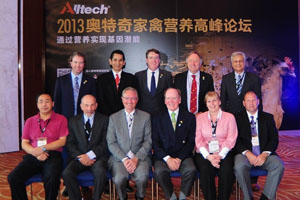China Summit focuses on future of poultry nutrition

Recent Chinese food scandals continue to pressure the meat industry to change the way it looks at animal production. Over 150 Chinese nutritionists and company leaders from the largest poultry producers gathered in the East China city Qingdao for the 2nd Alltech China Nutritional Poultry Summit to discuss the future of the Chinese poultry industries with well known local and international nutritional experts.
Expert speakers covered a variety of topics including nutrients such as amino acids, bioactive mannan rich fractions, bioplexed trace minerals, organic selenium, solid state fermentation enzymes and glucan based mycotoxin deactivators. Speakers included Mike Kidd of University of Arkansas, Wang Zong of the China Agriculture University, Peter Ferket of North Carolina State University, Lucy Waldron, Editor of World Poultry Science from New Zealand, ex-Yum China Director Joaquin Pelaez, Technical Poultry Director Aziz Sacranie, former CEO of Harim-Allen Farms Gary Gladys and Liu Yuehuan of the China Academy of Agriculture Science. The summit was chaired by Aidan Connolly, Vice President, Alltech Inc.
Just less than a year ago Chinese mainstream media reported that KFC Chicken in China are fed with chemicals and treated with antibiotics. One of the major Chinese chicken meat suppliers regularly used hormones to accelerate the growth of the birds. This type of media storm and several other scandals have put food safety concerns at the front and centre of the consumer’s minds and indeed the Government’s agenda. Just as these stories began to fade, the industry was hit by influenza and other health challenges at farm level. Such disease issues in Asia have increased mortality and can dramatically reduce performance and profitability according to Sacranie.
“Safe and traceable food is more important than ever,” said Dr. Mark Lyons, Vice President Corporate Affairs at Alltech, during his concluding remarks. Despite the numerous food safety and farm disease challenges, Lyons strongly believes that the future of the Chinese poultry industry is bright and he urged the audience to redefine the way they look at poultry nutrition.
At the center of this discussion was the fact that the bird’s immune system requires additional nutrient supplementation in times of disease challenge, Dr. Ferket suggested that this could be of the order of 20-25%. Research by Dr. Kidd in particular focused on the role of individual amino acids, and varying amino acids requirement for performance and health. Seeing that different nutrients elicit different immune responses it is clear that different diets can be formulated based on the challenge faced by the birds. For example, viral versus bacterial diseases. For this reason, proper nutrient management – incorporating the right nutrient at the right time and in the right form is fundamental for optimal immune function and recovery from disease.
To summarise the ideas presented, an ideal diet, from a disease prevention point of view, will address the detoxification of mycotoxins through the use of effective mycotoxin binding agents. An ideal diet will minimise undigested material through the use of solid state fermentation enzymes, bioactive MRF carbohydrates, and other plant extracts. An ideal diet will also contain bioavailable organically complexed minerals as well as optimal levels of vitamins, amino acids and other nutrients to create a balanced diet.
Overall, a wide range of speakers from different backgrounds demonstrated to the Chinese poultry industry that optimal performance and health can be achieved in the face of adversity. Tools do exist to minimise the damage caused by disease and other challenges. No issue is too big and solutions are always there to be found.













